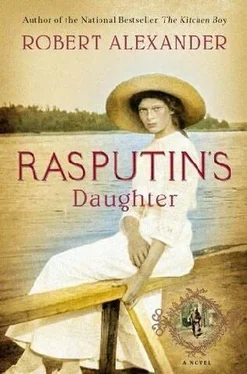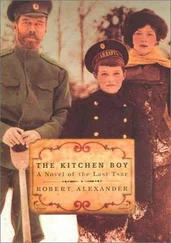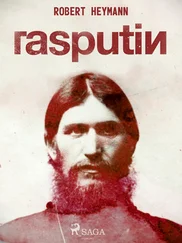Not long ago I’d brought a cup of tea to a princess, who was laughingly saying to an old baronessa, “Everyone knows that gossip and vranye-our beloved art of creative lying-are the only two things that keep our huge, ignorant country rolling ahead like some giant steamroller, wouldn’t you say, ma chérie?”
“Oui, bien sûr,” chuckled her aged friend, who, like so many of her class, only spoke the tongue of her native land to her lowly servants.
So when I woke the next morning I knew exactly what to do. I needed information, and I knew precisely where to get it.
By the time I had finished my breakfast of steaming kasha and tea, Papa was already receiving his first visitors of the day in the salon. There was a little man from Moscow who, from what I’d overheard, had come because he wanted to supply the army with large-sized military undergarments and needed my father’s help to moisten the deal. Another, a mother of six in dire financial need, had come in search of a prophecy: Would her husband come back from the front alive, or should she start giving up her children for adoption? Papa, as far as I could tell, declined the first, and in regard to the second, the mother, he opened a drawer and tossed her a stack of 2,000 rubles that someone had left as a bribe the day before. As I drank the last of my tea, I heard the woman fall sobbing on the floor to kiss his dirty boots in gratitude.
There was already a line outside our door, and one by one they were let in, humbling themselves before Father Grigori and begging to press their lips to his filthy hand. Sometimes Papa would see scores of petitioners in a single day, sometimes only a few. There was simply no telling how many he would receive this morning; when he’d had enough, he would just turn away and tell Dunya to send the rest packing.
While Papa was busy humbling several fashionable ladies by kissing them directly on the lips, and Dunya was occupied with a tiny nun who was quietly asking for one of Father Grigori’s dirty under linens-“But, please, give me one with sweat”-I ducked into his study. Going directly to my father’s desk, I took two things that were sure to lubricate the lips of any Russian, a small stack of rubles plus, most important, a handful of Papa’s already signed notes. Less than five minutes later I was sneaking out the back door of our apartment, disappearing down the service stairs completely unnoticed.
With my cloak bundled over my shoulders and my hood thrown over my head, I emerged from the courtyard of our building and through the front arch without being recognized. A damp, freezing wind whipped all around me, and I turned right on Goroxhavaya. As I walked toward the River Fontanka, just a block away, a flurry of horse cabs and a motorcar passed me, all hurrying in the opposite direction, I was sure, for the train station. It was ten in the morning and the sun, nearly at its weakest point in the year, was barely rising. Glancing at the low, steely-gray clouds blowing in from the Baltic, I realized we would have little more than five hours of light today, and by four this afternoon it would be dark.
Like all the canals and waterways in Petrograd, the River Fontanka had been captured and tamed several centuries earlier by the work of thousands upon thousands of serfs. Essentially transformed into a broad granite-lined canal, the river had once marked the very edge of the city but was now an elegant waterway lined with five-and six-story apartment buildings, none taller than the dome of the Winter Palace ’s cathedral, as was the imperial decree throughout the entire city. Where our street, Goroxhavaya, crossed the dark waters, many wealthier merchants lived in expansive flats, while up and around Nevsky Prospekt, many palaces, including the Anichkov Palace, the home of the Dowager Empress herself, could be found.
Reaching the river, I turned right again, heading directly into a freezing wind that came whooshing down the frozen river and bit at me like a wolf. Clutching my cloak as tightly as I could, I trekked on.
Some ten minutes later I was within a block or two of Nevsky when I felt someone tugging at the back of my cloak. Spinning around, I saw a filthy young boy dressed in ragged homespun, probably a war orphan who made his living stealing from people’s pockets and bags.
“Get away from me!” I shouted.
The boy, no more than ten, didn’t flinch. Instead, as the freezing wind whipped around us, he lunged toward me. I jumped back and was ready to scream when I saw that he was pressing a piece of paper at me.
“What is it? What do you want?”
He touched his throat and then his mouth and shook his head, and I realized the child couldn’t speak. He was obviously not only dirt poor but mute. And staring into this child’s narrow blue eyes and noticing his bright cheeks, I thought of the rubles I had taken. Of course I could give him some. Before I could, however, he grabbed my hand and shoved the bit of paper into it. I assumed, of course, it was simply a note begging for help-written by someone else, for surely this destitute urchin was illiterate-but when I unfolded it I saw a few lines of verse scrawled in fine handwriting.
Love tyrannizes all the ages
But youthful, virgin hearts drive
A blessing from its blasts and rages,
Like fields in spring when storms arrive.
Recognizing a few lines from Pushkin’s prose poem Evgeni Onegin, my heart suddenly started pounding.
“Where is he?” I demanded.
The boy grinned a sloppy smile-half his teeth were missing-and waved me to follow. It didn’t even occur to me to hesitate, and I quickly followed him across the wide road. As we headed down a narrow side street, the child grabbed my hand and clutched it in his, squeezing my fingers tightly.
Within a half block he steered me through an arched passage and into the cobbled courtyard of a four-or five-story building. There he stopped immediately. Holding up just one of his fingers to me, I understood.
“Sure, I’ll wait right here,” I said.
The boy nodded, dashed back to the edge of the passage, and peered around, obviously checking the street to see if we had been followed. Satisfied that we were alone, he scurried back with a grin, snatched my hand again in his, and led me to a far corner of the courtyard. Descending three steps, we entered a decrepit chai’naya-teahouse-with a low ceiling, hardly any light, and a handful of heavy wooden tables. Behind a counter stood two plump starushki, their heads bound in kerchiefs, one tending a large nickel samovar, the other making blini on a black iron skillet.
“Greetings, Boriska,” said one of the old women to the boy. “Can we get you a glass of tea today?”
His grin as big as ever, he shook his head and continued pulling me along. At least, I thought, the child has somewhere warm to go.
Following Boriska, I passed through a beaded curtain and into a room with just two tables. Boriska pointed to me and then to a stool.
“Of course,” I said, sitting down.
Nodding with pleasure that he’d done his job, the child then raised a hand in farewell.
“Wait,” I said, grabbing him by the hand. “Where are your parents?”
He smiled sadly and shrugged.
“Where do you live? Do you have anywhere to go at night?”
He scratched his neck and shrugged again, squinting his eyes in obvious embarrassment.
“I’m going to give you two things, Boriska,” I said, reaching into my pocket and pulling out the roll of money. “Here’s two hundred rubles-that’s a lot of money.”
His eyes widened and his head bobbed up and down. Whoever had given my father this stack of bills, this child could certainly use it as much or more than anyone else.
“And here’s something even more valuable,” I said, handing him one of my father’s little notes. “Can you read?”
Читать дальше












